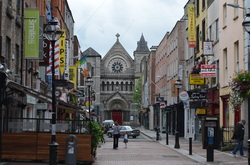
Mary explained that she likes to write precise prose that offers revelations to the reader.
In her first novel, the Virgin and the Boy, she has both the Virgin, rock and roll star Ginnie, and her love, the Boy, Luke both reach realizations about how their passion for each other changed their view on life and overwhelmed them.
Mary's first collection of poetry was published in her thirties about 1990, a second collection of her poetry, then her first novel Virgin and the Boy. She thinks that it feels like you pray when write poetry.
She believes that form is dictated by what we read, what we welcome, what interests us. She read good classical poetry in school and as a teenager she sometimes would write a poem, not that seriously. Out of necessity, she also wrote stories.
I think that it also is a matter of mastering the skills necessary to do it in capable way--I have still to master flash fiction since I want too much of a story arc. Flash fiction seems more like a prose poem to me.
She never saw poetry, nonfiction and fiction as being in a pyramid of what is most valuable; she didn’t aim to write fiction, in fact, fiction intimidated her because of all the time required.
I don't think so either. I do know, that when you write too much in other forms, you sacrifice your output in the other forms to some extent, i.e. if you write poetry alone, you're more likely to be more prolific.
She spoke about liminality in a work, from Merriam Webster, liminality means—of or relating to sensory threshold, barely perceptible. She explained that reason and temperament is not synonymous.
I think liminality is present in her first novel, Virgin and the Boy. Often, the characters are very much aware of the world around them, good places to see it is Luke's walk home with Kathleen and also the scenes at her apartment when he is very much aware of being male in a single woman's abode.
Poetry is about language, significance known in subconscious, and when writing poetry she finds herself hovering in one state. She was always happier writing, idea of the muse was valued.
I'd like to increase the amount of subconcious reactions from my characters in my stories.
As she turned toward language, poetry opened the world, and was an essential need. In her free time she’d work and dream. She didn’t want to be a feminist writer, found it circumscribing, but was a poet with others who were feminist and went around to readings. She finds the publishing world is not very welcoming to women, not many women represented in collections. She's not really open to writing to an agenda. Women she feels, would have trouble making their own archetypes. She believes that with lack of improvement of women represented in anthologies, that there is need for another all female anthology.
Yet, like many feminists, she shows in Virgin and the Boy, that sensuality is a major part of femininity. She mentioned that the sexual part of the novel was less accepted than the rest. I don't think any of the sex scenes are over the top--they don't offer a detailed experience of sex, just the idea that the characters were immersed in the sensations of loving someone.
I personally found the explicit language overwhelming even if it is common for youth to use it heavily in their conversations. I think a little raw talk goes a long way.
One thing I thought after her lecture that was presented at the Irish Writer's Centre was that I should try a voice collection of poems.
 RSS Feed
RSS Feed